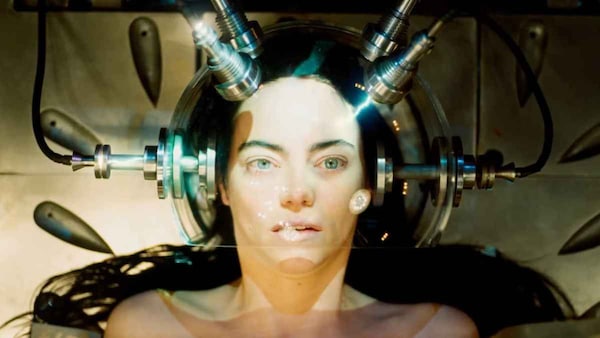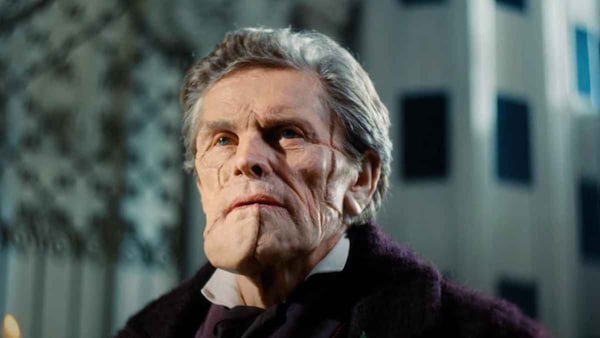Poor Things review: Emma Stone is outstanding in Yorgos Lanthimos’s quirky sci-fi satire
The film leans on stylistic visuals and vibrant costumes to tell a compelling satirical tale told through the eyes of a child in a woman’s body

Last Updated: 02.52 AM, Feb 28, 2024
Story: An eccentric yet brilliant scientist, Godwin Baxter (Willem Dafoe) brings a woman back to life after swapping her unborn child’s brain with hers. He names her Bella (Emma Stone) and develops a paternal relationship with her. However, his efforts to protect her childlike innocence from the harshness of the real world turn into a form of imprisonment. Bella soon demands that she be allowed to go on a globetrotting adventure with a lawyer named Duncan Weddedburn (Mark Ruffalo), who has ulterior motives to exploit her naïveté about the real world.

Review: Poor Things is an adaptation of Alasdair Gray’s eponymous novel. Greek director Yorgos Lanthimos, best known for award-winning films such as The Lobster and The Favourite, brings his unique brand of filmmaking to the film adaptation of Poor Things. With the opening 10 minutes of the film, Lanthimos takes the audience to an alternate reality that is part Victorian era, inspired by a Charlotte Brontë or Thomas Hardy novel, and part fictionalised futuristic era almost akin to steampunk worlds created by Jules Verne or H G Wells. However, the most obvious inspiration for both the book and the film would be the timeless tale of Frankenstein, written by Mary Shelley. The narrative puts a humorous and satirical spin on Frankenstein’s story and replaces the frightening monster with a beautiful young woman. Frankenstein's distinctive facial scars are instead given to Willem Dafoe’s character Godwin Baxter, the creator of the aforementioned young woman, Bella.

The narrative quickly establishes the oddities of this world envisioned by the writers. From the various chimaeras following Bella around inside Godwin’s house to the various contraptions used by Godwin, the audience is quickly given an understanding that they have been taken to an alternate reality, and it is almost entirely told through Bella’s perspective. The black and white shots in the first act of the film signify Bella’s monotonous life. As a child in a woman’s body, she is forced to confine herself within the walls of Godwin’s home and therefore lacks basic cognitive and mental abilities a woman should have. However, it is also depicted that she is an exceptionally quick learner, and she begins to learn things at an accelerated rate. By the end of the first act, she is fully self-aware of her surroundings, her being, her sexuality, and her yearning to explore the outside world.

The film quickly becomes vibrant and colourful as Bella travels to Lisbon with Duncan Weddedburn. Her sudden exposure to the outside world resembles how a child would marvel at the grand cities and picturesque sceneries. The sudden rush of human emotions such as joy, sorrow, anger, jealousy, and lust almost overwhelm her. But it also frees her from being shackled to societal norms that are often moulded into an individual over years of conformity. Bella’s adventure with Duncan offers her a chance to learn more about the world as she meets more people along her journey. Through Bella and Duncan, the narrative explores various themes of feminism and misogyny, and the contradictions of ideologies rife within society.

By the final act of the final, Bella has transformed into an intelligent woman, albeit in a very short period. She is no longer the “pretty retard”, as described by Max MaCandles (Ramy Youssef) when he is first introduced to Bella. Instead, she has transformed herself into someone who has complete agency over herself. The most obviously distinguishing factor is that she has learned to articulate herself better than most, despite being unable to string two words together at the start of the film. She is also able to rationalise better than most and she is able to look past the lies Godwin told her about her true parentage. Even though she is ultimately Godwin’s experiment, he cares for her like her own father. The fact that Godwin is referred to as God by Bella, is a nod at Godwin being the giver of life as her creator. The film is certainly not for the faint-hearted. Its strong depictions of gore and sex reverberate across the narrative and are incorporated to elevate its visual storytelling. It is also rich in symbolism and allegories to serve as social commentary on contemporary society.

Verdict: Yorgos Lanthimos’s Poor Things is a satirical examination of society’s irrational expectations of women. Through vibrant costumes, stylistic visuals, unconventional sound design, and outstanding performances by the cast, the narrative navigates through its weird yet astounding steampunk setting with aplomb. Referring to the film as ‘unconventional’ would be an understatement, but the care and attention to detail given to each frame adds meaning to its idiosyncratic style.
WHERE
TO WATCH
Subscribe to our newsletter for top content, delivered fast.

